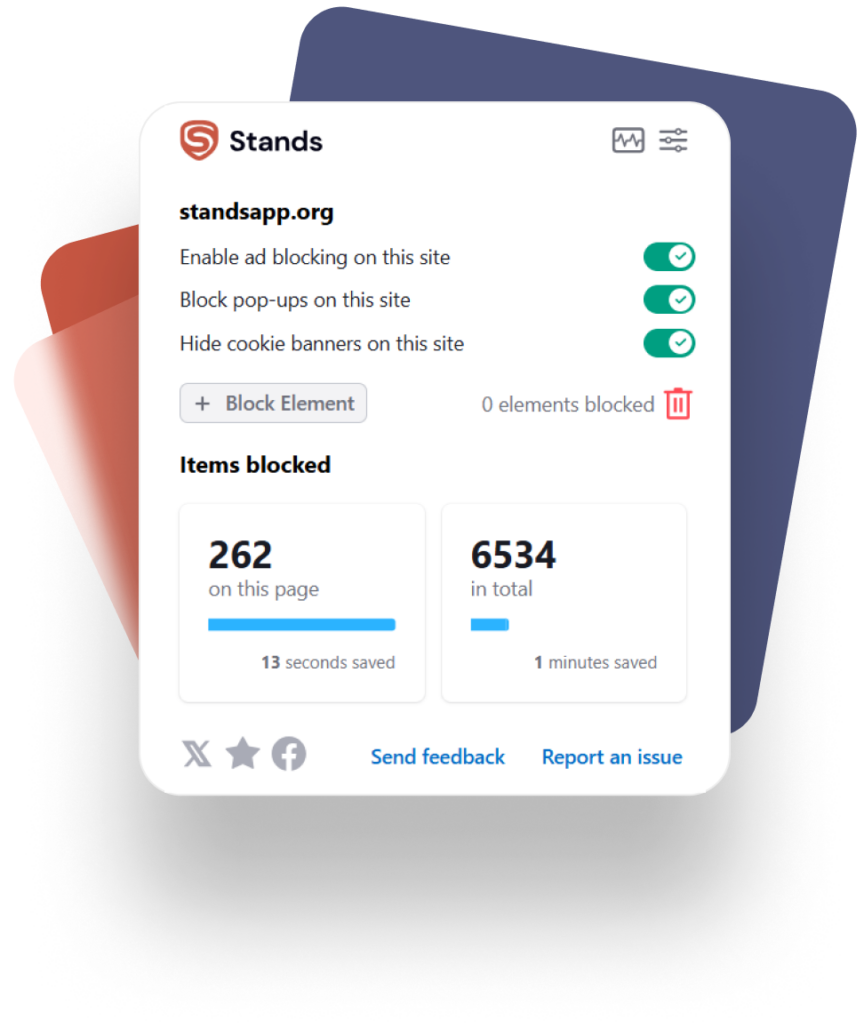 Home »
Home » 
Firefox vs Chrome: Which Web Browser Should You Choose
Chrome maintains first place in the web browser market in 2025 with an approximate market share of 66%. Although Firefox is less popular than Chrome, it remains one of the top choices for users searching for privacy. Find out which one is the best browser for you :)
- Mozilla Firefox vs Google Chrome
- What Is Google Chrome + Benefits
- What Is Mozilla Firefox + Benefits
- Google Chrome vs Firefox: Key Differences
- Disadvantages of Chrome
- Disadvantages of Firefox
- Compatibility with VPN
- Mozilla vs Chrome: Which One Works Better for Your Device
- Can You Use Both Chrome and Firefox Together
- Does Stands Adblocker useful for Firefox and Chrome?
- The Verdict: Google Chrome vs Mozilla Firefox
- FAQ
Mozilla Firefox vs Google Chrome
- Speed + performance: Chrome is known for its speed & efficiency when loading web pages and running applications.
- Privacy + security: Firefox stands out for its privacy & security features.
- Greater resource consumption: Chrome tends to consume more RAM, which could affect performance on devices with limited system resources.
- Extensions + personalization: Both browsers offer a wide range of extensions, although Chrome has a more extensive library with 111,993 extensions.
What Is Google Chrome + Benefits
Google Chrome is a web browser developed by Google, launched in 2008. It is based on the open-source Chromium project and utilizes the Blink rendering engine and V8 JavaScript engine.
Main advantages
- Improved browsing performance: Thanks to its multi-process architecture & V8 engine, it offers a faster browsing experience.
- Library of extensions: The Chrome Web Store offers thousands of extensions to customize the browser's functionality.
- Synchronization: By signing in with your Google account, you can sync bookmarks, browsing history, and privacy settings across multiple devices.
- Google services: Chrome integrates with Gmail, Google Drive, and Google Docs.
Browse without interruptions while using Chrome. Download an effective Ad Block for Chrome.
Why Google Chrome Is Popular
The popularity of Chrome is due to:
- Great speed + efficiency: Chrome allows you to load pages quickly and handle multiple tabs.
- Integration with Google: Its compatibility with other Google services provides a seamless user experience.
- Regular updates: Google releases regular updates that enhance security and performance, as well as add new features.
- Technical innovations: Incorporating AI-based built-in tools, such as the Gemini assistant, improves the browsing experience.
Performance Features of Google Chrome
Google Chrome has implemented several attractive elements to optimize its performance:
- Memory-saving features, such as Memory Saver Modes, help reduce RAM consumption by suspending inactive tabs.
- Advanced protection: The new Advanced Protection uses AI to detect and prevent threats in real-time, although it requires manual activation by the user.
- Gemini AI integration: The Gemini assistant, integrated into Chrome, can summarize web content, compare products, and browse websites to make everything easier for the user.

What Is Mozilla Firefox + Benefits
Mozilla Firefox is an open-source web browser developed by the Mozilla Foundation. Available for Windows, macOS, Linux, Android, & iOS, it stands out for its commitment to user privacy, customization, and compliance with web standards.
Main advantages:
- Open source and transparency: Being open source allows the community to constantly audit and improve the browser, fostering trust and innovation.
- Customization: It offers a wide range of extensions and themes, allowing the browser to be tailored to each Firefox account's individual preferences.
- Optimized performance: Firefox has improved, offering smooth browsing even with limited resources.
- Synchronization between devices: With Firefox Sync, users can securely synchronize bookmarks, browser history, & saved passwords across multiple devices.
Browse ad-free with one of the best Ad Blocks for Firefox and the latest updates.
Why Firefox is Better Than Chrome for Privacy
Firefox has become a preferred choice for those who prioritize online privacy. Unlike Chrome, which collects a significant amount of user browser data, Firefox uses proactive measures to protect personal information.
Key features:
- Enhanced tracking protection: It automatically blocks advertising & analytics trackers without additional extensions.
- Reduces fingerprinting: Reduces websites from identifying & tracking users by collecting device and browser information.
Would you like to learn how to clear cookies in Firefox? Follow our easy guide.
Performance Features of Mozilla Firefox
Firefox has significantly improved its performance, ensuring a fast and efficient browsing experience.
Key improvements:
- Efficient resource consumption: Designed to use less RAM than Chrome and other browsers.
- Support for multiple processes: It is easier to distinguish between tabs, allowing for better management of background processes.
- Frequent updates: Mozilla releases regular updates that introduce new features, optimize performance, and resolve potential vulnerabilities.
- Web standards compatibility: Firefox supports the latest web standards, ensuring that sites load and function correctly.

Google Chrome vs Firefox: Key Differences
Performance: Chrome Browser vs Firefox
Chrome:
- Resource consumption: Chrome is known for its high RAM usage, especially when handling multiple tabs, which can affect computer performance with limited resources.
- Stability: Its multi-process architecture isolates each tab, improving stability and preventing crashes in one tab from affecting others.
Firefox:
- Efficiency: Firefox has proven to be more efficient in its resource utilization.
- Rendering engine: It utilizes the Gecko engine, which has been optimized to deliver fast load times and a smooth browsing experience.
Chrome offers a fast experience, but at the cost of resource-intensive consumption. However, Firefox provides efficient performance, making it ideal for computers with limited resources. The best browser to use will depend on your needs :)
Speed: Which Browser Is Faster
Both browsers offer competitive performance, but with some differences:
- Google Chrome: It is known for its fast web page loading and application execution, thanks to its V8 JavaScript engine and optimized architecture.
- Mozilla Firefox: Although it has significantly improved its speed in recent years, it is still slightly slower than Chrome in some performance tests.
Chrome maintains a slight advantage in speed. However, Firefox offers good speed, with the added benefit of lower resource consumption.
Privacy and Security: Firefox vs Chrome
Firefox:
- Being open source allows the community to constantly audit and improve the browser, fostering transparency & trust.
Chrome:
- Although Chrome has implemented privacy improvements, it continues to be criticized for its data collection and user tracking, particularly in incognito mode and private browsing.
- Chrome offers robust security features, including process isolation and frequent updates, to protect against various threats.
Disadvantages of Chrome
Although Chrome is one of the most popular browsers, it has some significant drawbacks:
- Chrome is known for its high RAM & CPU usage, especially when handling multiple tabs.
- Chrome has been criticized for its data collection and user tracking practices.
- The transition to the Manifest V3 specification has restricted the capabilities of extensions such as ad blockers.
Disadvantages of Firefox
Mozilla Firefox is valued for its focus on privacy, but it also has some limitations:
- Some websites and web applications are primarily optimized for Chrome, which can cause functionality issues.
- Although Firefox offers a wide range of add-ons, its library is more limited.
- Constant updates can annoy some users, especially if they interfere with extensions.
- Firefox may perform slightly worse on devices with limited resources.
Compatibility with VPN
Both Google Chrome and Mozilla Firefox are compatible with VPN services, allowing users to protect their privacy and security online:
- Chrome supports VPN extensions available in its Chrome Web Store, including NordVPN and ExpressVPN.
- Firefox offers a service called Mozilla VPN, which provides encryption and utilizes the WireGuard protocol for a secure connection.

Mozilla vs Chrome: Which One Works Better for Your Device
Should I Use Firefox or Chrome on Mac
Chrome
- Chrome is known for its speed and efficiency on macOS, especially on devices with Intel processors.
- Chrome uses up more system resources (RAM and CPU), which could affect laptop battery life.
Firefox
- Firefox has improved its performance on macOS, but some users have reported that it still consumes a significant amount of memory and resources.
Which Is Better on Android
Chrome
- Pre-installation: Comes pre-installed on most Android devices, offering a smooth and fast experience.
- Integration: Integrates seamlessly with other Google services like Gmail and Google Drive.
Firefox
- Extensions: Allows the installation of extensions, although their performance may be slightly lower than Chrome.
Chrome offers a faster experience and is better integrated into the Android ecosystem. Firefox is ideal for those who prioritize privacy and want to customize their browsing experience :)
Firefox or Chrome: Which Is More Compatible with Linux
Mozilla Firefox:
- Compatibility: It is the default browser in many Linux distributions and is optimized for this operating system.
- Privacy: Offers advanced privacy features and is entirely open source.
Google Chrome:
- Performance: Offers solid performance on Linux, although it may consume more resources than Firefox.
- Extensions: Has an extensive library of available extensions.
Conclusion: Firefox is generally preferred in Linux environments due to its native integration and focus on privacy. Chrome is viable if you need a wide range of extensions and willing to accept higher resource consumption.
Can You Use Both Chrome and Firefox Together
Yes, using both browsers on the same device is entirely possible and pretty common. This allows you to take advantage of the strengths of each:
- Chrome: Ideal for fast browsing and deep integration with Google services.
- Firefox: Excellent for tasks that require greater privacy and customization.
Both browsers can help test web compatibility or separate personal and professional activities. Using both can offer the best of both worlds. However, the choice between Firefox and Chrome depends on your priorities and device.
Does Stands Adblocker useful for Firefox and Chrome?
Stands AdBlocker is a 100% free extension designed to block online ads, improve browsing speed, and increase your productivity :) It provides ease of use and is compatible with major browsers, including Google Chrome, Mozilla Firefox, Microsoft Edge, Opera, Brave, Vivaldi & Android mobile.
Key features:
- Improved online performance: Blocking unwanted content speeds up page loading and reduces mobile data usage.
- Intuitive interface for all users: Offers easy setup and customization options and lets you block ads according to your preferences.
Why You Should Choose Stands AdBlocker for Firefox and Chrome
Stands AdBlocker has been optimized to work effectively on Firefox and Chrome, offering an uninterrupted browsing experience.
In Google Chrome:
- Seamless integration: Integrates seamlessly with the browser, providing a consistent and hassle-free user experience.
In Mozilla Firefox:
- Focus on privacy: Complements Firefox's privacy features, offering additional protection against invasive ads.
- Advanced customization: Allows you to adjust blocking settings according to your needs, balancing functionality & privacy.
Advantages of Stands Adblocker in Both Browsers
- Cross-platform compatibility: Works on various browsers, including Chrome, Firefox, Edge, and a version for Android.
- Regular updates: Constantly updated to adapt to new advertising techniques and ensure continuous quality.

The Verdict: Google Chrome vs Mozilla Firefox
- Security: Both browsers offer security features, including secure browsing, malware detection, and regular updates. However, Chrome tends to release security patches more quickly due to its resources and organizational structure.
- Speed: Performance tests show that Google Chrome tends to be faster at running web applications and in speed tests such as Speedometer and JetStream. Mozilla Firefox still lags slightly behind in some speed metrics.
Many users choose Firefox because of its focus on privacy, its open-source nature, and its independence from large corporations. In addition, Firefox allows for greater customization and is viewed by some as a form of resistance against the hegemony of companies like Google.
Learn how to stop Google ads in simple steps and browse ad-free.
FAQ
Is Firefox Better Than Chrome for Privacy
Yes, private browsing on Firefox provides a better experience, featuring default blocking of third-party trackers and cookies. In addition, its structure as a non-profit organization reinforces its commitment to user privacy.
Is Mozilla Firefox vs Google Chrome More Secure
Both browsers are secure and offer similar protections against online threats. However, an aspect to consider is that Chrome tends to release security updates quickly, whereas Firefox provides greater transparency by being open-source.
Which Is Faster: Mozilla Firefox vs Chrome
Google Chrome is faster at running web applications and in specific performance tests. Firefox has improved considerably but may still lag slightly behind in specific speed metrics.
Why Do People Use Firefox Instead of Chrome
Reasons include its focus on privacy, open-source software, the possibility for greater customization, and a perception of independence from large corporations. For many, using Firefox is a deliberate choice in favor of privacy and ethical web browsing.
